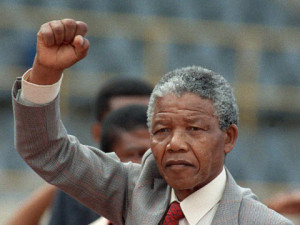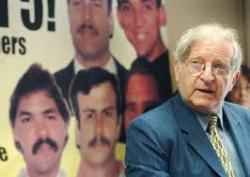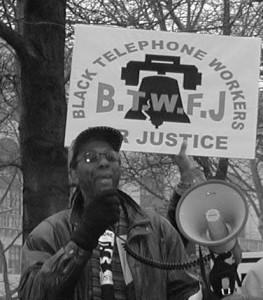 The Black Workers for Justice along with the South African masses and freedom and justice minded people across the globe grieve the passing and salute the life of former South African President, Nelson Mandela.
The Black Workers for Justice along with the South African masses and freedom and justice minded people across the globe grieve the passing and salute the life of former South African President, Nelson Mandela.
Many of the founders of our organization came to political life in support of the struggle for African liberation, which included the fight against South African Apartheid. We understood that form of human degradation was based ideologically and structurally on the Jim Crow system in the US South.
Much is being written about his revolutionary legacy so we briefly and humbly list what is important to us and the movement for Black liberation and workers’ power.
He chose to fight and resist the racist system first through mass protest and when the brutally of the regime intensified, through armed struggle. He worked with an organization, the African National Congress that functioned on the basis of a collective and democratic leadership, which required accountability and discipline.
He supported a non-racial democratic South Africa as a way of freeing the Black majority from the shackles of a poisonous racist system and the exploitation of capitalism. He understood the need for workers, through their trade unions, to work with other revolutionary organizations in pursuit of workers rights, and power in the workplace and society.
From our inception as an organization in 1982 we supported the struggle against Apartheid by fundraising; hosting visitors representing the African National Congress-ANC, the Pan-African Congress-PAC, the Azanian People’s Organization-AZAPO, the Congress of South African Trade Unions-COSATU and many others; picketing, holding rallies and doing education. We called for the release of Nelson Mandela and all the political prisoners in South Africa. We especially remember having Dorothy Makgalo, COSATU National Organizing Secretary and National Gender Coordinator as a guest who spoke to women workers and others in Eastern North Carolina. In other words we had no direct relationship with the esteemed comrade but our relationship to his work and legacy was through the South African masses and other freedom fighters.
While media, pundits and US politicians speak about their love and respect for Mandela we remember the role played by the US government in supporting Apartheid through economic and political means. The insidious role of corporations, diplomats, politicians and US intelligence services is well documented and cannot be covered by US Presidents, past and present. While they now lift up Mandela’s imprisonment, we must say that the US has political prisoners like Seth Hayes and Leonard Peltier among many others, who have languished in US gulags for 40 years in some cases.
In the same way we constantly fight to lift up the radical essence of Dr. King, we will forever be engaged in the struggle to uphold the revolutionary aspects of Nelson Mandela’s legacy.
The struggle in South Africa is intensifying as the Black impoverished masses engage in the fight to realize the tenets of the ANC Freedom Charter and other documents that call for land ownership for the masses and ownership of the means of production by the workers. They fight against the whites that continue to control the economy in partnership with a corrupt Black elite. We are confident that the struggle for jobs, housing and education will one day lead to the fulfillment of the goals of the South African revolution.
While the defeat of the racist and dehumanizing system of Apartheid in South Africa was an important victory for democracy without fundamental structural changes in the economy and social institutions to empower the Black and oppressed majority, democracy in South Africa has not yet brought about the revolutionary transformation promised by the revolutionary struggle.
We as African Americans and workers here in the U.S. must continue to learn from our Azanian/South African sisters and brothers struggle for a society where all workers and oppressed have workplace democracy and Human Rights.
Long Live the Revolutionary Legacy of Nelson Mandela!







